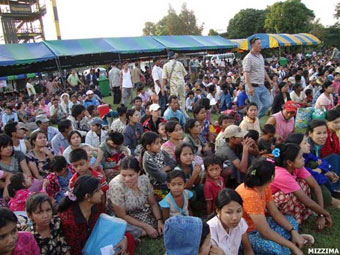Ethnic conflict issues in Burma are off-limits to investigations by the Burmese Human Rights Commission (HRC), the commission chairman said in a press conference on Tuesday.
 Win Mra told journalists in Bangkok that attempts at reconciliation were “essentially political,” and the commission had decided investigations into abuses in the conflict zones were “not appropriate at this present point in time.” Both sides in the long-going civil war have been accused of human rights violations.
Win Mra told journalists in Bangkok that attempts at reconciliation were “essentially political,” and the commission had decided investigations into abuses in the conflict zones were “not appropriate at this present point in time.” Both sides in the long-going civil war have been accused of human rights violations.
“With the establishment of the peace, other problems like human rights violations and atrocities supposed to be committed against ethnic groups will also recede into the background,” he told Agence France Presse.
So far, the rights commission has heard cases involving land confiscation, prison abuse, mistreatment by officials and other issues, Win Mra said.
“You are right in saying that human rights problems continue because this is something that cannot be tackled within a short period of time,” he was quoted as saying. “It is a process, as you would know, but I think we have started to handle this problem.”
Human Rights Watch in a report in January accused the Burmese army of abuses including rape, torture and killing of civilians in ethnic minority conflict zones in 2011.
The U.N. special envoy to Burma, Tomas Ojea Quintana, expressed concern about the HRC’s independence in a statement he released in Rangoon on February 5.
“I am concerned that there are no indications as yet that the commission is fully independent and effective in compliance with the Paris Principles,” he said. “At present, it seems that the commission cannot fully guarantee human rights protection for all in Burma.
“I was informed that the commission’s draft rules of procedure were being examined by the judiciary, and were awaiting the approval of the Council of Ministers. This sends the wrong signal that the commission is not fully independent from the government.”
He said the commission’s prison visits were dependent on presidential authorization and that there did not seem to be clarity on its procedures, including for handling complaints and conducting prison visits.
“There is clearly a strong need to enhance the technical and substantive capacity of the commissioners and its staff on human rights issues,” he said.
Recently, the Burmese government has undertaken extensive negotiations with ethnic rebels and has successfully concluded cease-fires and peace agreements with the majority of the armed groups.
President Thein Sein, a former general who came to power last year when the Parliament was formed, has vowed to work towards an end to civil war that has gripped large parts of Burma since independence in 1948. An inclusive peace agreement is one of the demands of Western nations, which imposed sanctions on the regime.
The government has made progress on democratic reforms, but observers say that the ethnic conflict and political grievances are the country’s most difficult problem to be resolved.



